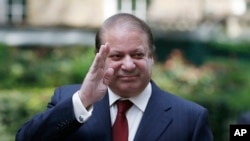Pakistani political leaders and rights activists say they are “thrilled” that seventeen-year-old Pakistani education activist Malala Yousafzai has become the youngest Nobel Peace Prize winner in history and believe her achievement has dealt a blow to extremist forces who wanted to kill her.
Prime Minister Nawaz Sharif congratulated Malala, describing her the “pride of Pakistan.”
Ruling party lawmaker Marvi Memon spoke to VOA to express her feelings.
“We are ecstatic [and] extremely pleased. This is a huge proud, happy moment for all of us, for Malala, for her family and for all of Pakistan. She has become a symbol of bravery, of persistence, of consistency and of continuous struggle.”
Memon believes the Nobel Peace Prize for Malala offers an opportunity for her government and rights groups to step up efforts aimed at educating Pakistani women.
“Here Nobel Prize actually means that other children and other girls, especially, get better education in the future. I think Malala’s real success is when we honor her in that way and when other Pakistani girls benefit from her struggle,” she said.
Farzana Bari, a human rights activist and university professor, said Malala’s achievement will enhance efforts to promote education and rights awareness among Pakistani women.
"They are struggling and Malala represents that struggle, [the] courage of women of Pakistan. So, I think that is why we feel it makes people like us very, very proud and we feel that because of her courage, because of her struggle, we can really walk with our heads up.”
Bari said the Nobel Peace Prize is a major setback to extremist forces in Pakistan who condemned Malala Yousafzai as an agent of West to undermine Pakistan’s global image.
Malala is from Pakistan’s northwestern Swat valley, where she was shot in the head by a Taliban gunman two years ago after she criticized the extremist group’s anti-women's policies. She survived several operations after being airlifted to Britain where she is currently living.
Speaking in Birmingham, Malala said she was honored to be chosen to win Nobel Peace Prize. She added it has encouraged her to carry forward her mission so girls in Pakistan do not suffer like she did.
“I had really two options: one was not to speak and wait to be killed and the second was to speak up and then be killed, and I chose the second one," she said.
"At that time there was terrorism [in Swat], and women were not allowed to go outside of their houses, education was totally banned, people were getting killed," Malala said.
I needed to raise my voice because I wanted to go back to school. Its my message to children all around the world that they should stand up for their rights,” she said.
Malala also called for peace between Pakistan and India. She shared the Nobel Peace Prize with Indian child rights advocate Kailash Satyarthi.
Malala invited Sharif and his Indian counterpart Nerandra Modi to attend the December ceremony where the Nobel Peace Prize will be awarded.
“I believe in peace, I believe in tolerance and patience and it is very important for the progress of both countries that they have peace and they have [a] good relationship. This how they are going to achieve success and this how they are going to progress.”
Malala is the second Pakistani Nobel laureate and first Nobel Peace Prize winner.











